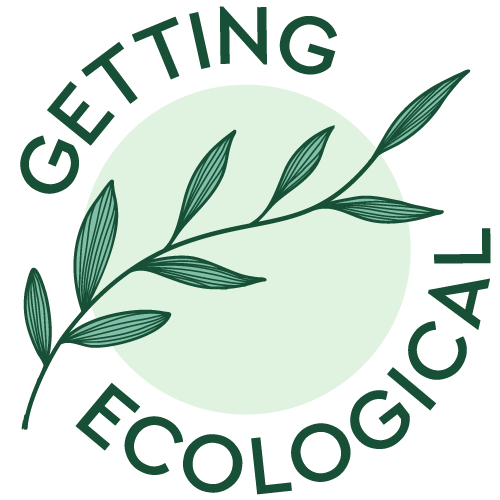When delving into discussions about sustainability you might have found it can be overwhelming, with a number of technical terms and concepts. Fear not! We are here to help you understand some of the key terms you need.
Below, Getting Ecological will explore 12 important terms that are essential for anyone looking to engage in meaningful conversations about sustainability.
1. Carbon Footprint:
The carbon footprint represents the total amount of greenhouse gases, particularly carbon dioxide, that an individual, organization, or product is responsible for emitting directly or indirectly. Understanding and reducing one’s carbon footprint is a fundamental step towards mitigating climate change.
2. Circular Economy:
Unlike the traditional linear economy, where products are made, used, and disposed of, a circular economy aims to minimize waste and make the most of resources. It involves practices such as recycling, reusing, and upcycling to create a closed-loop system that is more sustainable in the long run.
3. Biodiversity:
Biodiversity refers to the variety of life on Earth, including the diversity of species, ecosystems, and genetic diversity within species. Protecting biodiversity is crucial for maintaining ecological balance and ensuring the resilience of ecosystems in the face of environmental changes.
4. Renewable Energy:
Renewable energy sources, such as solar, wind, and hydropower, are derived from natural processes that are continually replenished. Investing in and transitioning to renewable energy is a key component of sustainability, as it reduces dependence on finite fossil fuels and lowers carbon emissions.
5. Fair Trade:
Fair trade is an ethical trading partnership that aims to ensure fair wages and working conditions for producers in developing countries. By supporting fair trade products, consumers contribute to sustainable development and poverty reduction in marginalized communities.
6. Water Footprint:
Similar to the carbon footprint, the water footprint measures the total amount of freshwater used by an individual, organization, or product. Understanding and reducing water consumption is vital for conserving this precious resource and addressing water scarcity issues globally.
7. Sustainable Agriculture:
Sustainable agriculture focuses on cultivating crops and raising livestock in a way that minimizes environmental impact, promotes biodiversity, and maintains the health of the soil. It includes practices such as organic farming, agroforestry, and crop rotation.
8. Greenwashing:
Greenwashing refers to the deceptive marketing practice of making false or exaggerated claims about the environmental benefits of a product or company. Being aware of greenwashing is crucial for consumers to make informed choices and support genuinely sustainable practices.
9. Life Cycle Assessment (LCA):
LCA is a comprehensive analysis that evaluates the environmental impact of a product or process throughout its entire life cycle, from raw material extraction to production, use, and disposal. It helps identify opportunities for improvement and guides more sustainable decision-making.
10. Upcycling:
Upcycling is the process of transforming waste materials or unwanted products into new, higher-value items. Unlike recycling, which involves breaking down materials, upcycling creatively repurposes them, reducing the overall demand for new raw materials and minimizing waste.
11. Carbon Offset:
Carbon offsetting involves investing in projects that reduce or capture an equivalent amount of greenhouse gas emissions to compensate for one’s own emissions. While not a silver bullet, carbon offsets can be part of a broader strategy to achieve carbon neutrality.
12. Triple Bottom Line:
The triple bottom line (TBL) is a framework that considers three dimensions of sustainability: economic, social, and environmental. It encourages businesses and organizations to evaluate their performance based on not just financial profits but also their impact on people and the planet.
Staying Informed
As we make a conscious effort for a more sustainable future, understanding these key terms is essential. Whether you are an individual looking to make more eco-conscious choices or a business aiming to adopt sustainable practices, a grasp of these terms will empower you to make a real contribution to sustainability discussions and targets.

